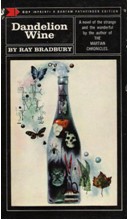One of the most famous 20th century science fiction writers, Ray Douglas Bradbury, has written many books that deserved awards. Dandelion Wine is about the main character, Douglas Spaulding, spending the summer of 1928 in Waukegan, Illinois. The background information provides us with the fact that this book is semi-autobiographical.
 |
Dandelion Wine by Ray Douglas Bradbury |
The main theme or message is not like that of Star Wars or other books mainly read by young teenagers. I am by no means criticizing them, but Dandelion Wine has a great depth into something more fundamental in human nature. And in this book, even though technology is not really the main motif, it plays an important enough role to convey crucial themes.
There is the town jeweler, called Leo Auffman. One day, he invents the "Happiness Machine." In the machine, a person inside can visit Paris, Rome, and sunsets last forever with perfect temperature. Leo tells his wife to try it out, but she comes out crying that it is a "Sadness Machine" because just for a moment she was really in Paris, but all of a sudden she was drawn back into the reality and notices that it never happens.
"Sunsets we always liked because they only happen once and go away. If the sunset stayed and we got bored, that would be a real sadness."
This one saying of his wife, Lena, seems as though this is exactly the message that must be conveyed in this chapter. Somehow, people long for something unrealistic, but no one gets used to it otherwise the real world would go dim. Real happiness is what is happening in this very moment, and nobody wants the world to change.
Miss Fern and Miss Roberta, two old women in the town bought an electric car, called "The Green Machine." They get very excited about it and take it for a ride around the town. One day during a ride they hit a woman. They are uncertain if she is dead or alive, if somebody saw them or not. But the only steady thing that they know is that they will never use the Green Machine again, and that technology is not worth human life.
For Douglas' grandfather, the morning he hears the sound of cutting grass in lawn is the time when he feels summer has officially begun. He was lying down on the porch smiling, when Bill Forrester, a newspaper man visited him with new technology, "grass that does not need cutting." If he has it planted in his lawn, he will not need time to cut it with the lawn mower. However, the grandfather was fully against it.
"Why? Because they bend you over and turn you away from all the people and the town for a little while and sweat you and get you down where you remember you got a nose again. And when you are all to yourself that way, you are really yourself for a little while; you get to thinking things through, alone. Gardening is the handiest excuse for being a philosopher. "
This is definitely one of the most impressive scenes in this book because it depicts modern technology so well. People always try to save time and do things as quickly as possible. They eliminate the necessity to do things that they have been doing since a long time ago. It is not a waste of time and there is no need to hurry. They ride in a car to go anywhere, but sometimes they get to walk in order to feel, to think and to be themselves.
Technology as sub-motif does convey messages to the readers through growth of the characters who appear in this book. It is, whether it does good or bad, an unquestioned reality that human beings have to face. The author directly and precisely throws questions about the way of life and the status of oneself such as satisfaction, irritation, and depression. There are many chapters whose themes and ideas differ from each other, but as a whole, the author's objective is to turn us to think, feel and look at every little thing that people do not notice throughout everyday living which builds up the reality.
Child Research Net would like to thank the Doshisha International Junior/Senior High School and Yusuke Kimura, student and author, for permitting reproduction of this article on the CRN web site.














